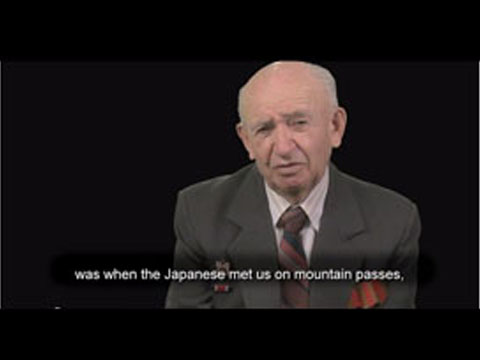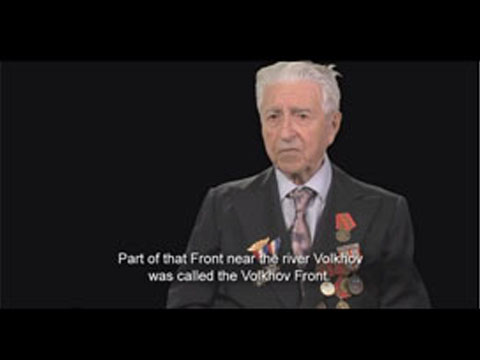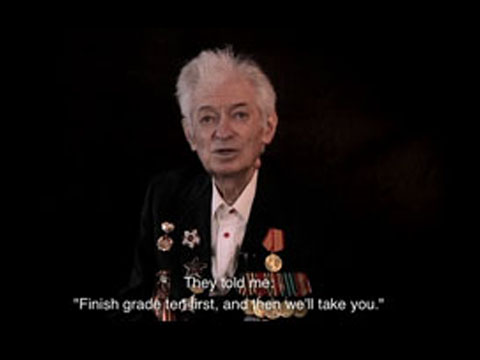
Zinoviy Rovner
Born September 6th 1925 in Kiev, Ukraine
Interviewed In: Toronto, Ontario
Medals Awarded: Order of the Patriotic War (1st and 2nd Class) and Victory over Germany In The Great Patriotic War
“The commander was pronounced a coward”
Navy Engineer and Minesweeper – served on ‘Marina Roskova’
Victor served as a minesweeper in the Russian Navy. His most memorable moments of the war stem from an incident in the Kara Sea. “That was a transport to carry 10,000 tons of food and a lot of people heading to Dixon and further to Igarka and other places. Our convoy left Arkhangelsk, crossed the Yugora Strait, Novaya Zemlya and entered the Kara Sea. While in the territory of the Kara Sea, there were several reports that our sonar, the Americans called it ASDIC, received an echo. However the convoy commander, captain 1st class … I can’t recall his name…he said those were apparently big stones on the sea bottom. Sound of a backfire. “Marina Raskova” stopped. We saw smoke coming out of the pipe”. Victor was on one of the two minesweeping ships sent to investigate the smoke. “Our minesweeper was in front. The convoy commander was on board #118. The #118 commander decided to force it up. He cut off in front of our bow, same way as do cars on a city road. When he cut off in front of our bow, all of a sudden an explosion occurred. We saw a column of fire and smoke. The #118 started going down. The #118’s side sank.
After awhile a second explosion was heard on the side. Again a column of fire and smoke was seen. And #118 was gone. At that time the commander ordered to down a boat, to down a cutter and we managed to pull a number of people out of the water”.
The rescue could not be finished as 2 Nazi submarines apperred on radar. Victor’s boat left the area without all of the suvrviving passengers from the Marina Raskova.
“And so to make my story short, only “Marina” and our minesweeper were left there. The situation with the commander was like this. The longboat with our sergeants was at “Marina Raskova”. There were people on board “Marina Raskova” to be saved. On the other hand we had more than 100 “newcomers”. As the lieutenant commander had said earlier there were 2 submarines in view. The commander figured it out that engaging with them would mean suicide for us. He figured they would torpedo us and that would be it. Of course it was insane to be anchored to avoid being blown up on a magnetic mine… although our windings were demagnitized, there was no way we could be blown up on a magnetic mine. I figure this was incompetence on the part of the convoy commander. At that time many competent admirals had been repressed. That was the reason why incompetent people climbed up the career ladder. And so he was one of them. That’s my personal opinion. To make my story short, the commander ordered to go away in the direction of the Cape Zhelaniya. Cape Zhelaniya was the northernmost point of Novaya Zemlya”.
Victor’s commander was forced to resign in disgrace. His unit was eventualy able to restore their reputation by locating a German submarine that was later destroyed.
“We were moving back and forth. We were changing the course all the time. We tried to take position above the submarine. We were in the state of combat alert for 42 hours…. This time they greeted us like heroes”.
Victor became an electrical engineer after the war. He moved to Canada following political infighting at the academy of science, which may have been based in anti-Semitism.

Born September 6th 1925 in Kiev, Ukraine
Interviewed In: Toronto, Ontario
Medals Awarded: Order of the Patriotic War (1st and 2nd Class) and Victory over Germany In The Great Patriotic War

Born: March 1 1920 Ukraine. Passed Away: 2012 Toronto, Ontario.
Interviewed In: Toronto, Ontario
Medals Awarded: Order of the Patriotic War (1st and 2nd Class), Medal for Defense of Leningrad and Victory over Germany In The Great Patriotic War

Born 1927 Soviet Union
Interviewed In: Vancouver, British Columbia
Medals Awarded: Order of the Patriotic War (1st and 2nd Class), Order of the Red Star, Medal For Capture of Berlin, Medal For Capture of Konigsberg and Victory over Germany In The Great Patriotic War